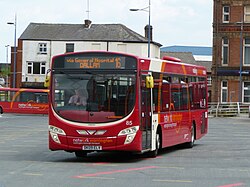Network Warrington
 |
|

|
|
| Slogan | making warrington move |
|---|---|
| Parent | Warrington Borough Council |
| Founded |
Warrington Corporation Tramways in 1902 Warrington Corporation Transport Department in 1935 Warrington Borough Council Transport Department in 1972 Warrington Borough Transport in 1986 |
| Headquarters | Warrington |
| Service area | Cheshire, Greater Manchester, Merseyside |
| Service type | Bus services |
| Destinations | Warrington Borough, Altrincham, Earlestown, Leigh, Northwich |
| Fleet | 80 vehicles (April 2017) |
| Chief executive | Ben Wakerley |
| Website | www.networkwarrington.co.uk |
Network Warrington is a Municipal bus company, running a network of services within the Borough of Warrington, England and into the surrounding area, including Altrincham, Leigh, Earlestown and Northwich. It is owned by Warrington Borough Council.
Warrington Corporation Tramways started operating a network of five radial tramways from the town centre in 1902, with the first motor bus service starting in 1913. Buses replaced trams on routes starting in 1931, with the infrastructure starting to require major renewal which could not be justified economically. The last tram operated in 1935.
Services expanded rapidly after the Second World War as new housing estates grew in areas such as Orford and Great Sankey. The conversion of bus routes with conductors into one-man operated services began in 1965.
Warrington was designated as a new town in 1968, which led to new housing estates planned in the Birchwood and Westbrook areas of town. As such, Warrington Borough Council Transport Department (as the transport department was then called) started operating new services to these new developments as they started to grow in the 1970s and beyond. The department also began operating new services jointly with Crosville upon the split of the old based North Western Road Car Company in 1972.
To comply with the Transport Act 1985, Warrington Borough Transport was incorporated in 1986. The company's mission was that if money could be made by operating services deemed uneconomic by other operators, then it should assume operation. This policy led to an increase in services operated as other bus companies who ran into the area decided to concentrate on their own core areas.
...
Wikipedia
